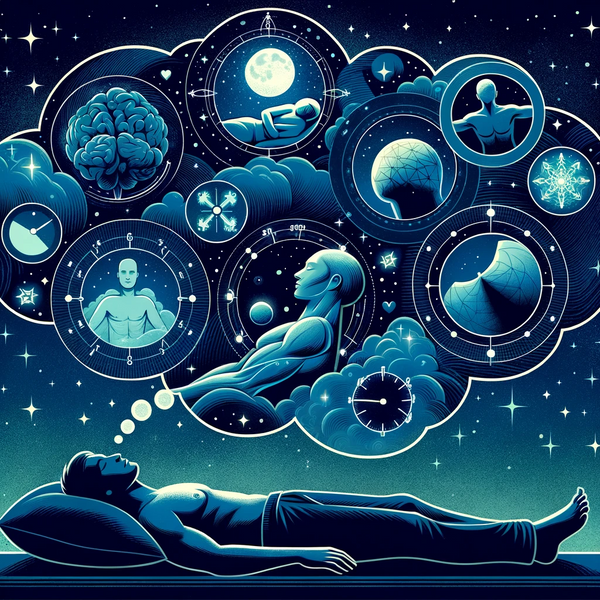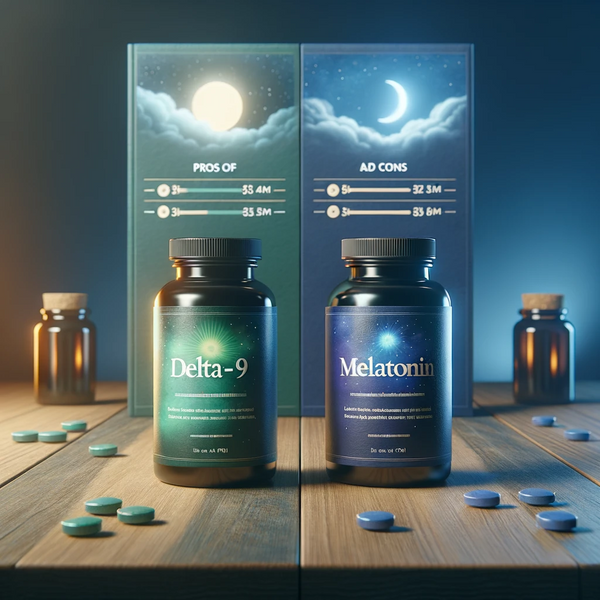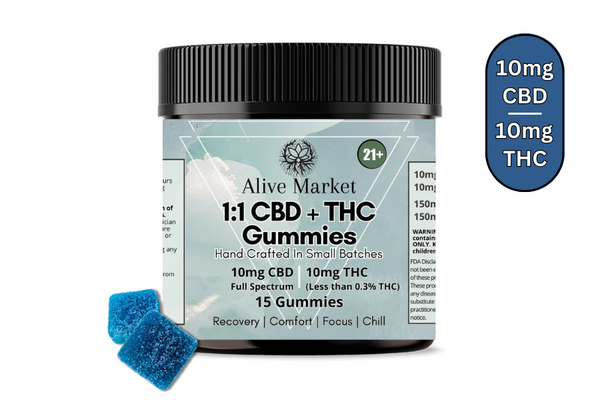In today's fast-paced world, the quest for a good night's sleep has led many of us down various paths. From weighted blankets to ambient sound machines, the search for the perfect solution to our nocturnal struggles seems never-ending. Among these myriad options, natural remedies like hemp plants have surged in popularity. There's a growing recognition that sometimes nature knows best.
Enter Delta-9, a compound often whispered about in wellness circles and touted as a potential sleep aid. But what exactly is Delta-9, and can it truly be the remedy so many are searching for? In this article, we'll delve deep into its properties, benefits, and whether it could be the answer to your sleep disorders.
What is Delta-9?

At the heart of the cannabis sativa plant lies a complex profile of compounds known as cannabinoids. Among these, delta-9-tetrahydrocannabinol, commonly referred to as delta-9-THC or simply THC, stands out as the most renowned. It is the primary psychoactive component in cannabis, responsible for the cannabis sativa plant mind-altering effects. When people refer to the "high" associated with marijuana, they're primarily talking about the effects of Delta-9.
But cannabis use isn't just about Delta-9. The cannabis sativa plant boasts over a hundred different other cannabinoids, each with its own unique properties. One of the other major players in the cannabinoid realm is cannabidiol (CBD). Unlike delta-9, CBD doesn't produce a high. Instead, it has gained attention for its potential therapeutic benefits, including anti-inflammatory and anti-anxiety effects.
The comparison between Delta-9 and CBD is akin to comparing two siblings from the same family; while they share a lineage and some similarities, they have distinct personalities. As more research into cannabis use continues to grow, our understanding of these cannabinoids and their potential benefits evolves. Whether you're looking at Delta-9 for its primary psychoactive component effects or CBD for its therapeutic potential, it's clear that the world of cannabis is vast and varied.
How Does Delta-9 Affect Sleep?

Sleep, often seen as a simple nightly ritual, is a nuanced physiological process deeply interwoven with our body's internal systems. One such system that plays a role in regulating sleep disorders is the endocannabinoid system (ECS).
- Interaction with the Endocannabinoid System:
Our bodies have a complicated cell-signaling system called the extracellular matrix (ECS). It maintains homeostasis, or balance, in many bodily functions, such as sleep, mood, and appetite. The ECS and delta-9-THC work together because they bind to the same cannabinoid receptors. The central nervous system has the most Cannabinoid receptors (CB1). This interaction influences various neurotransmitters and hormones, potentially altering sleep patterns.
- Effects on Sleep Cycles:
Sleep isn't just a monolithic block of unconsciousness; it consists of different stages, including REM (rapid eye movement) sleep and deep sleep phases. Research indicates that Delta-9 can increase the amount of deep sleep one experiences, which is the restorative phase of sleep. This might sound promising, but it's worth noting that Delta-9 may also reduce rapid eye movement sleep, the phase associated with dreaming. While the full implications of reduced REM sleep are still under investigation, some theories suggest it might impact memory and learning.
- Immediate vs. Prolonged Use Effects on Sleep Patterns:
Like many substances, the effects of Delta-9 on sleep can vary based on usage patterns. An occasional user might find that Delta-9 helps them fall asleep faster and sleep deeper. However, prolonged and frequent use can lead to changes in how it affects sleep. Over time, some individuals might experience difficulty to fall asleep without the aid of Delta-9, or they might find their sleep quality diminishing. Tolerance can also develop, leading to the need for increased dosages to achieve the same sleep-inducing effects.
Benefits of Using Delta-9 for Sleep-Related Issues

The allure of a peaceful night's rest is universal, and Delta-9, with its unique properties, has become a beacon of hope for many seeking solace in the arms of Morpheus. Here's a look at some of the potential benefits of using Delta-9 as a sleep aid:
- Reduction in Sleep Latency:
One of the most frustrating aspects of insomnia, a common sleep disorder, is lying in bed, eyes wide open, waiting to fall asleep. Known as sleep latency, this period can feel agonizingly long for some. Many users report that Delta-9 helps them transition to sleep more quickly, reducing the time spent tossing and turning.
- Potential for deeper sleep:
Deep sleep, often referred to as slow-wave sleep, is the phase where our bodies undergo repair and regeneration. It's crucial for feeling refreshed and restored the next morning. Some research suggests that Delta-9 can enhance the depth and quality of this sleep stage, offering users a more profound rest.
- Decreased nighttime awakenings:
Constantly waking up in the middle of the night can be disruptive and prevent one from achieving continuous, restful sleep. Anecdotal evidence and some studies hint that Delta-9 THC might assist in reducing these nighttime disturbances, allowing for a more uninterrupted sleep architecture.
- All Natural Chronic Pain Relief:
People with health issues such as post-traumatic stress disorder (PTSD), chronic pain, and inflammatory diseases like multiple sclerosis and rheumatoid arthritis often turn to Delta 9 THC as source of pain relief.
This compound is renowned for its effectiveness in alleviating chronic pain, post traumatic stress disorder, health condition like multiple sclerosis thus promoting sleep quality. Its use results in fewer disruptions during the night, allowing for a more restful and uninterrupted sleep.
This can be particularly beneficial for those who struggle with sleep disturbances as a symptom of their underlying health condition. By improving sleep quality, Delta 9 THC can play a significant role in the overall chronic pain management.
- Effective Management of Treating Chemotherapy-Related Nausea
Delta 9 THC, a compound found in cannabis, has shown potential to help treating chemotherapy-induced nausea. It works by interacting with the body's endocannabinoid system, which plays a key role in regulating nausea and vomiting.
By binding to specific receptors in the brain, Delta 9 THC can effectively reduce the sensation of nausea and the occurrence of vomiting associated with chemotherapy treatments. This can be particularly beneficial for cancer patients, as it not only alleviates a common and distressing side effect but also can help improve their appetite and overall sense of well-being.
This, in turn, can support better nutrition and strength, aiding in their overall treatment and recovery process. Delta 9 THC's role in managing chemotherapy-induced nausea highlights its potential as a supportive treatment in comprehensive cancer care.
Potential Side Effects and Considerations of Using Delta-9 for Sleep related issues
While Delta-9 THC potential benefits as sleep aid have piqued the interest of many, it's crucial to also consider the potential side effects and implications of its use. Here's a comprehensive look at some of the considerations to keep in mind:
Much like the lingering feeling some experience after a night of drinking, Delta-9 THC can result in a 'weed hangover'. Users might wake up feeling groggy, foggy-headed, or fatigued, even after a full night's sleep. This can be particularly concerning for those who need to be alert and focused in the morning, such as individuals with demanding jobs or those who operate heavy machinery.
As mentioned earlier, Delta-9 THC can reduce the duration of REM sleep, the phase associated with dreaming. This reduction can lead to diminished dream recall. While some might consider fewer nightmares or vivid dreams a bonus, it's worth noting that rapid eye movement sleep plays a role in emotional processing and memory. A consistent lack of dream recall might indicate disrupted REM cycles.
With regular use, there's a potential for developing a tolerance to Delta-9, meaning one might require higher doses to achieve the same sleep-inducing effects. Over time, this could lead to dependence, where an individual feels they cannot sleep without the aid of Delta-9. If and when they decide to stop or reduce their usage, withdrawal symptoms like irritability, mood swings, and insomnia might ensue.
Delta-9 THC doesn't exist in a vacuum. When combined with other medications, there can be unpredictable interactions. For instance, combining Delta-9 THC with other depressants or anything like drug alcohol depend or certain sedatives, can enhance their effects, leading to excessive drowsiness or respiratory depression. Additionally, those with conditions like respiratory disorders, heart diseases, or mental health conditions like anxiety or bipolar disorder might experience exacerbated symptoms when using Delta-9 THC.
Dosage and Administration of Delta-9 THC for Sleep
Determining the correct dosage and understanding the nuances of administration can significantly impact the effectiveness of Delta-9 THC as a sleep aid. Here's a guide to help navigate this territory:
How to Determine the Right Dosage- Start Low and Go Slow: Especially for those new to Delta-9 THC, it's advisable to start with a low dose and gradually increase it until the desired effects are achieved. This method allows users to find the minimum effective dose without overdoing it.
- Personal Factors: Dosage can vary based on individual factors like body weight, metabolism, tolerance, and the specific sleep disorders one faces. Consulting with a cannabis-knowledgeable physician can help determine an appropriate starting dose.
- Keep a Journal: Documenting your dosage, timing, and the resulting quality of sleep can help fine-tune the amount needed for optimal benefits.
- Oils and tinctures are liquid extracts that can be taken sublingually (under the tongue) or added to foods and drinks. They offer a relatively quick onset and allow for precise dosing.
- Edibles: These include products like gummies, chocolates, and baked goods. While they might take longer to kick in (typically 30 minutes to 2 hours), their effects can last longer, making them suitable for sleep.
- Vapes: Vaporized Delta-9 THC offers an almost immediate onset, but its effects might not last as long as other forms. It's essential to consider the health implications of vaping and choose high-quality products free from harmful additives.
- Capsules: Similar to edibles in their delayed onset, capsules offer a standardized dose, eliminating some of the guesswork.
- Oils/Tinctures: For sleep disorders, consider taking them 30 minutes to an hour before bedtime.
- Edibles and capsules: Due to their delayed onset, it might be beneficial to consume them 1 to 2 hours before sleeping.
- Vapes: Given their immediate effect, vaping can be done closer to bedtime, perhaps 10–30 minutes prior.
The world of Delta-9 THC is intricate, and finding the right fit in terms of dosage and administration can be a journey of clinical trials and error. What works for one person might differ for another. It's essential to approach it with patience, attentiveness, and the guidance of professionals in the field.
Comparison with Other Natural Sleep Aids
The world of natural sleep aids is diverse, with each option offering unique properties and benefits. Let's delve into how Delta-9 THC stacks up against some popular alternatives: melatonin, valerian root, and CBD.
Delta-9 THC vs. Melatonin:
- Melatonin is a hormone that the pineal gland naturally produces in response to darkness to let our bodies know it is time to sleep. Delta-9 THC, on the other hand, interacts with the endocannabinoid system to produce its effects.
- Benefits: Both can help reduce sleep onset latency. However, melatonin primarily works by regulating the sleep-wake cycle, making it especially beneficial for issues like jet lag. Delta-9 THC might offer deeper sleep and reduce nighttime awakenings.
- Side Effects: While Delta-9 THC might lead to grogginess or altered REM sleep, melatonin can cause headaches, dizziness, or nausea in some people.

- Mechanism: Valerian root is an herb traditionally used to treat insomnia and anxiety. It's believed to increase GABA levels in the brain, producing a sedative effect.
- Benefits: Both Delta-9 THC and valerian root can help with sleep onset and improve sleep quality. However, valerian might take longer (up to several weeks) to exhibit noticeable effects.
- Side Effects: Valerian root is generally well-tolerated but can cause gastrointestinal issues or dizziness in some. Compared to Delta-9 THC, it has a less pronounced psychoactive effect.
Delta-9 THC vs. CBD:

- Mechanism: Both Delta-9 THC and CBD interact with the endocannabinoid system, but in different ways. While delta-9 THC binds primarily to CB1 receptors and is psychoactive, CBD does not produce a high, and its interaction with cannabinoid receptors is more complex.
- Benefits: Both cannabinoids have potential sleep benefits. While Delta-9 THC can induce sleepiness and deepen sleep, CBD is often hailed for reducing anxiety, which can indirectly improve sleep disorders.
- Side Effects: CBD is generally non-psychoactive and might produce fewer side effects like grogginess or altered REM sleep compared to Delta-9 THC.
Unlock the Best of Both Worlds: Alive Market 1:1 CBD + THC Infused Gummies
Alive Market's 1:1 CBD+THC Gummies provide a harmonious blend of two of the most sought-after cannabinoids, ensuring users get the best of both worlds in every bite. Each gummy offers a balanced dose of 10mg THC and 10mg Full Spectrum CBD, carefully crafted to tap into the synergistic effects of both compounds.
With 15 gummies in every pack, they are designed not just for a delightful taste but also with an emphasis on promoting restful sleep. By merging the relaxing properties of CBD with the subtle sedative qualities of THC, these gummies present an all-natural, potent solution for those nights when sleep seems elusive.
Combined Effects of Delta-9 THC with Other Sleep Aids
Combining Delta-9 THC with other sleep aids can produce synergistic effects, enhancing the overall sleep experience. For instance, combining Delta-9 THC with CBD can mitigate some of Delta-9's psychoactive effects, leading to more relaxed and restful sleep. However, combining Delta-9 THC with other sedatives (like high doses of melatonin or valerian) might enhance sedative effects, which could be undesirable for some.
Always exercise caution and seek professional advice when considering combining Delta-9 THC with other sleep aids. Individual reactions can vary, and it's essential to ensure a safe and effective approach to improving your sleep disorders.
Can Delta 9 show in Drug test?
Yes, Delta 9 THC can show up on a drug test. Most standard drug tests, particularly those for cannabis, are designed to detect THC (tetrahydrocannabinol), the psychoactive compound in marijuana. Delta 9 THC is the primary form of THC found in cannabis and is responsible for the cannabis plant psychoactive effects.
Overview of the Legal Status of Delta-9 THC
Delta-9-THC, commonly just referred to as THC, is the primary psychoactive compound in cannabis use. Its legal status varies widely across the globe.
- United States: As of my last training data in January 2022, Delta-9 THC is federally illegal but has been legalized for medical use in many states and for recreational use in a growing number. The exact number and conditions can change, so always check local laws. It's also essential to note that federal and state laws can conflict, leading to complexities in areas like transportation across state lines.
- Canada: Smoked Cannabis, including Delta-9 THC, became legal for recreational use in 2018 under the Cannabis Act. However, provinces and territories have their own regulations around sales and distribution.
- European Union: The legal status varies significantly among EU countries. While some countries have decriminalized or legalized personal use, others have strict prohibitions. Medical cannabis use is available in several countries, but the conditions and availability vary.
- Australia: Medical cannabis is legal under federal law, but recreational use remains illegal. However, certain states and territories have decriminalized personal use.
- Asia: Most Asian countries have strict anti-cannabis laws. In some places, possession can lead to severe penalties, including long prison sentences.
Recommendations on Where and How to Source Quality Delta-9 THC Products:
- Certified Dispensaries: In regions where cannabis is legal, either medically or recreationally, always purchase from licensed and regulated dispensaries. They often have stringent quality controls and offer a range of products.
- Third-Party Lab Testing: Verify that a reputable, independent third-party lab has tested the product. This confirms the potency and ensures there are no harmful contaminants.
- Avoid Black Market Products: Especially with items like vape cartridges, the black market has seen instances of harmful additives that can pose significant health risks.
- Ask for Recommendations: In legalized areas, healthcare professionals, particularly those specializing in medical cannabis, can be excellent resources for recommending trustworthy brands and products.
- Product Labeling: Ensure the product label clearly indicates the amount of Delta-9 and other cannabinoids. This helps with dosing and understanding what you're consuming.
- Origin and Growing Practices: If possible, learn about where and how the cannabis was grown. Organic and pesticide-free options might be preferable for health-conscious consumers.
Quality and safety should be paramount. Given the varied effects of Delta-9 on individuals, knowing you have a pure and accurately labeled product is key to ensuring a positive and beneficial experience.
Conclusion
Navigating the world of sleep aids can be a complex endeavor, and in recent years, Delta-9 has emerged as a potential contender for promoting restful nights. The promise of reduced sleep onset times, the potential for deeper sleep, and fewer nighttime awakenings make it an enticing option for those struggling to find solace in the realm of dreams.
However, like any remedy, it comes with its own set of considerations. The possibility of morning grogginess, effects on dream recall, and concerns regarding tolerance and dependence underline the importance of approaching its use with informed caution. And, as with any controlled substance, its interaction with other medications or conditions and its legal and availability concerns further emphasize the intricacies of its adoption.
At the heart of this exploration is the recognition that everyone's sleep journey is personal. What works wonders for one might be lackluster for another. But in all pursuits, especially those tied to our health and well-being, knowledge is empowerment. Being armed with the right information can guide choices that align best with individual needs.
And so, dear readers, if the allure of Delta-9 beckons in your quest for restorative sleep, take a moment of pause. Reflect on the benefits, weigh the considerations, and most importantly, seek the counsel of a healthcare professional. Sleep is a precious commodity, and its guardianship warrants the utmost care and prudence. Sweet dreams!



